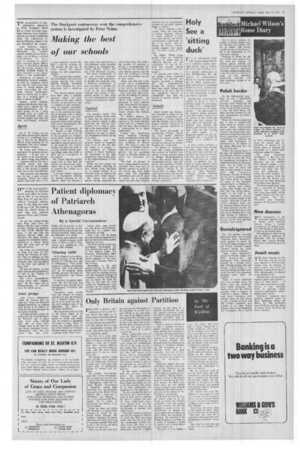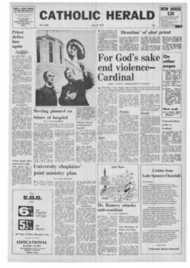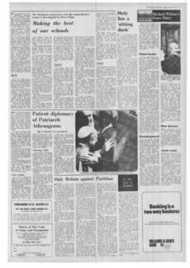Page 3, 14th July 1972
Page 3

Report an error
Noticed an error on this page?If you've noticed an error in this article please click here to report it.
Tags
Share
Related articles
Synod Breaks Off To Welcome Patriarch
Rome And The Orthodox
Orthodox Meeting With Pope
Pope Flying To See Patriarch In Istanbul
26 Cardinals Meet In Secret
Patient diplomacy of Patriarch Athenagoras
By a Special Correspondent
ONE of the most dramatic meetings in Christian history took place in Jerusalem in 1964. It was between Pope Paul VI and the Ecumenical Patriarch, Athenagoras I, who died last week at the age of 86. The meeting broke the official silence of more than nine centuries between Rome and Constantinople.
No one has worked harder than Pope Paul from the Roman side that such a reconciliation, desired and prepared, .by John XXIII, should take place. In the year after the meeting between Pope and Patriarch, the latter formally annulled the Orthodox excommunication of Rome dating from the early part of the , eleventh century.
His action was reciprocated by Pope Paul who, in 1967, visited the Patriarch in Istanbul. This was perhaps an even more historic occasion than the Jerusalem one, and was typical of the mind and method of Pope Paul.
He was not content, as had been innumerable predecessors, to wait in the Vatican for others to visit him.
He thus accomplished. among many other "pilgrimages", the first papal visit to Constantinople, or Istanbul, since the eighth century.
Joint pledge
And when Athenagoras visited the Vatican later the same year, Pope and Patriarch pledged themselves, at a special joint service in St. Peter's, to work for full unity between the two great Churches.
In furthering this worthy objective the task of the Ecumenical Patriarch was in many ways much more difficult than that of Pope Paul. Though head of the 250 million strong Orthodox Church. Athenagoras had far less power than the Pope, Rather did he preside, as first among equals, over the various self-governing patriarchate and national churches which make up Orthodoxy as a whole.
In future. such authority and such a church-structure could easily, in West as well as East, assume new significance and greater inner strength.
`Glowing faith'
As Dr. Eugene Carson Blake, general secretary of the World Council of Churches, has said of Athenagoras: "The combination of a visible and glowing Christian faith with generous love for all mankind shone through and gave the basis for his ecclesiastical and human leadership."
It was thus, by patient diplomacy. that the Patriarch had managed to lead virtually all of heterogeneous Orthodoxy into the W.C.C.
Opposition came mainly from the Church of Greece, and the fact that the Patriarch was a Turkish subject (as he has to be by law) was one of the most constant tests of his diplomatic, but above all Christian, pertinacity.
But the greatest tests of all lie in the future. Bigots in all camps. however much bypassed by trends and events, may yet succeed in disrupting the cause of unity. When reunion was brought about by the 1438 Council of Florence, half-heartedness and misunderstandings made it short-lived. Future talks must involve not only Rome and Constantinople but, in a special way, Canterbury as well.
And it can only be hoped that the towering inspiration of the late Patriarch will be neither forgotten nor lost.
The Holy Synod of the Constantinople Patriarchate has been meeting this week to elect its new spiritual leader. The favourite, Metropolitan Meli ton of Chalcedon, has been a fervid supporter of the unity cause and a frequent visitor at the Vatican.
Meanwhile, in his own special message to this Holy Synod, Pope Paul has written : "We recall the meetings we had with the venerated deceased in Jerusalem, Istanbul and Rome and we thank the Lord for them, in the hope the work
started by Athenagoras I may continue for the greater glory of God and the welfare of His Church."
blog comments powered by Disqus









